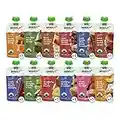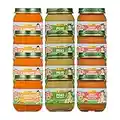As parents, we all want what's best for our little ones, especially when it comes to their nutrition. It's essential to provide them with the right kind of food that can help with their growth and development. One of the best options is organic baby food. This type of food is made without any harmful chemicals or additives, which makes it an excellent choice for your baby's health. In this guide, we'll explore the benefits of organic baby food, how to choose the right one, and even how you can prepare it on your own.
Introducing the Benefits of Organic Baby Food and its Impact on Health
One of the most significant advantages of organic baby food is that it's free from harmful chemicals. It doesn't have any pesticides, antibiotics, or growth hormones that could affect your baby's health. Studies have shown that organic foods are higher in essential vitamins and minerals, which are crucial for your baby's growth and development.
Apart from that, organic baby food is also known to have a better taste than conventional options. This is because it's made from high-quality ingredients, which enhances the flavor. Additionally, parents can have peace of mind that they are providing their little ones with safe and nutritious food.
How to Choose High-Quality Organic Baby Food for your Infant
Choosing the right kind of organic baby food can be overwhelming, especially with so many options available. However, there are a few things you can consider to ensure that you get the best for your baby. Firstly, always read the label and check the ingredients. Choose products that are certified organic by a reputable body.
Another thing to look out for is the texture of the food. Depending on your baby's age, you may want to opt for purees or more solid foods. Hence, it's essential to choose a product that is age-appropriate.
Lastly, always check for any allergens and make sure that the food is free from any potential allergens that your baby may have.
Preparing Your Own Organic Baby Food at Home
Preparing your baby's food at home can be a great option, especially if you want to ensure that you know the ingredients. Making your own organic baby food is simple, and you can easily do it at home with the right tools.
Start by choosing fresh, organic fruits and vegetables. Blanch them and then puree them using a food processor or blender. You can store the puree in an airtight container in the refrigerator or freezer.
Apart from fruits and vegetables, you can also include grains, dairy, and meat in your baby's food. However, ensure that you introduce these foods one at a time and check for any allergens.
Healthiest Organic Foods for Babies to Try and Enjoy
Some of the healthiest organic foods for babies include avocado, bananas, sweet potatoes, peas, and applesauce. These foods are packed with essential vitamins and minerals that can help with your baby's growth and development.
Apart from that, you can also include rice cereal, yogurt, and pureed chicken or fish in your baby's diet. Remember to introduce new foods slowly and not all at once.
Exploring the Different Ways You Can Serve Organic Baby Foods
There are many different ways you can serve organic baby foods to your little ones. Pureed foods are great, especially for younger babies. As your baby grows, you can introduce more textures, such as mashed or chopped foods.
You can also try different combinations of fruits and vegetables to provide your baby with a variety of nutrients. Lastly, don't be afraid to add herbs and spices to enhance the flavor of the food.
Tips to Make Sure You’re Making the Best Choices for Your Child's Nutrition
Lastly, here are a few tips to make sure you're making the best choices for your child's nutrition. Firstly, introduce new foods slowly and check for any allergic reactions. Secondly, opt for organic foods whenever possible to minimize exposure to harmful chemicals.
Lastly, always read the label and know what you're feeding your baby. Choose products that are certified organic, and avoid foods with added sugars or artificial ingredients.
Conclusion
Organic baby food is an excellent choice for parents who want to maintain the highest level of nutrition for their little ones. It's free from harmful chemicals and additives and is higher in essential vitamins and minerals. Choosing the right organic baby food can be overwhelming, but by considering a few factors such as ingredients, texture, and allergens, you can make an informed decision.
Additionally, preparing your baby's food at home with fresh, organic ingredients is a great way to ensure that you know what they're eating. Finally, introducing new foods slowly and being aware of potential allergens can help keep your baby healthy and happy.

![Plum Organics | Stage 2 | Organic Baby Food Meals [6+ Months] | Fruit & Veggie Variety Pack | 4 Ounce Pouch (Pack of 18) Packaging May Vary](/_ipx/f_webp,q_30,fit_outside,s_120x120/https://m.media-amazon.com/images/I/516ZC9T1WWL._SL160_.jpg)

